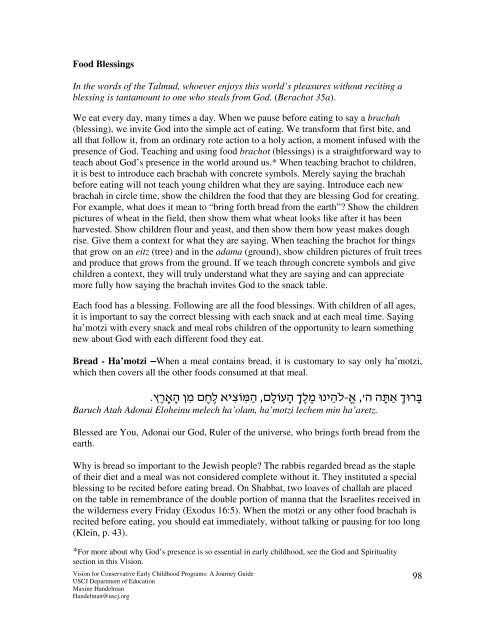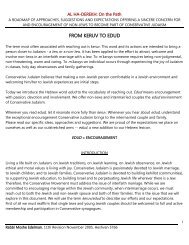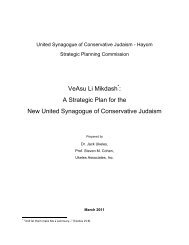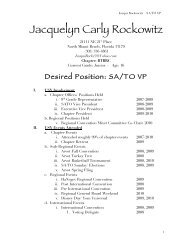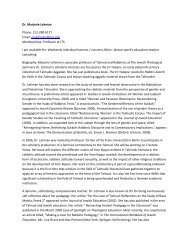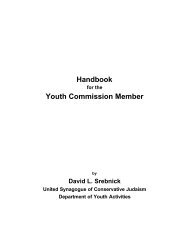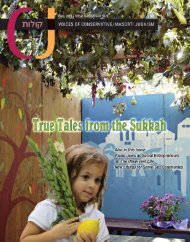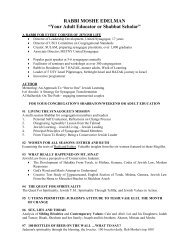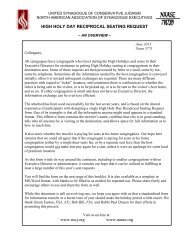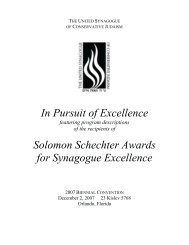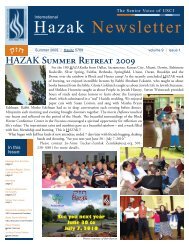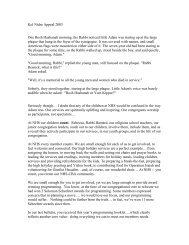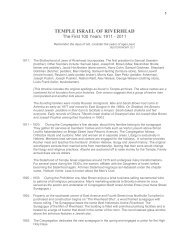Vision for Conservative Early Childhood Programs: A Journey Guide
Vision for Conservative Early Childhood Programs: A Journey Guide
Vision for Conservative Early Childhood Programs: A Journey Guide
Create successful ePaper yourself
Turn your PDF publications into a flip-book with our unique Google optimized e-Paper software.
Food Blessings<br />
In the words of the Talmud, whoever enjoys this world’s pleasures without reciting a<br />
blessing is tantamount to one who steals from God. (Berachot 35a).<br />
We eat every day, many times a day. When we pause be<strong>for</strong>e eating to say a brachah<br />
(blessing), we invite God into the simple act of eating. We trans<strong>for</strong>m that first bite, and<br />
all that follow it, from an ordinary rote action to a holy action, a moment infused with the<br />
presence of God. Teaching and using food brachot (blessings) is a straight<strong>for</strong>ward way to<br />
teach about God’s presence in the world around us.* When teaching brachot to children,<br />
it is best to introduce each brachah with concrete symbols. Merely saying the brachah<br />
be<strong>for</strong>e eating will not teach young children what they are saying. Introduce each new<br />
brachah in circle time, show the children the food that they are blessing God <strong>for</strong> creating.<br />
For example, what does it mean to “bring <strong>for</strong>th bread from the earth”? Show the children<br />
pictures of wheat in the field, then show them what wheat looks like after it has been<br />
harvested. Show children flour and yeast, and then show them how yeast makes dough<br />
rise. Give them a context <strong>for</strong> what they are saying. When teaching the brachot <strong>for</strong> things<br />
that grow on an eitz (tree) and in the adama (ground), show children pictures of fruit trees<br />
and produce that grows from the ground. If we teach through concrete symbols and give<br />
children a context, they will truly understand what they are saying and can appreciate<br />
more fully how saying the brachah invites God to the snack table.<br />
Each food has a blessing. Following are all the food blessings. With children of all ages,<br />
it is important to say the correct blessing with each snack and at each meal time. Saying<br />
ha’motzi with every snack and meal robs children of the opportunity to learn something<br />
new about God with each different food they eat.<br />
Bread - Ha’motzi –When a meal contains bread, it is customary to say only ha’motzi,<br />
which then covers all the other foods consumed at that meal.<br />
2 + *<br />
" ! , 1<br />
" - () &. %<br />
Baruch Atah Adonai Eloheinu melech ha’olam, ha’motzi lechem min ha’aretz.<br />
Blessed are You, Adonai our God, Ruler of the universe, who brings <strong>for</strong>th bread from the<br />
earth.<br />
Why is bread so important to the Jewish people? The rabbis regarded bread as the staple<br />
of their diet and a meal was not considered complete without it. They instituted a special<br />
blessing to be recited be<strong>for</strong>e eating bread. On Shabbat, two loaves of challah are placed<br />
on the table in remembrance of the double portion of manna that the Israelites received in<br />
the wilderness every Friday (Exodus 16:5). When the motzi or any other food brachah is<br />
recited be<strong>for</strong>e eating, you should eat immediately, without talking or pausing <strong>for</strong> too long<br />
(Klein, p. 43).<br />
*For more about why God’s presence is so essential in early childhood, see the God and Spirituality<br />
section in this <strong>Vision</strong>.<br />
<strong>Vision</strong> <strong>for</strong> <strong>Conservative</strong> <strong>Early</strong> <strong>Childhood</strong> <strong>Programs</strong>: A <strong>Journey</strong> <strong>Guide</strong><br />
USCJ Department of Education<br />
Maxine Handelman<br />
Handelman@uscj.org<br />
98


